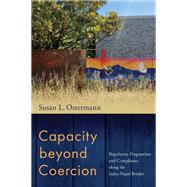Capacity beyond Coercion Regulatory Pragmatism and Compliance along the India-Nepal Border
, by Ostermann, Susan L.- ISBN: 9780197661116 | 0197661114
- Cover: Hardcover
- Copyright: 11/11/2022
State capacity is often equated with coercion. However, history has shown that it is extremely difficult for states with weak capacity to ensure compliance with their laws.
In Capacity beyond Coercion, Susan L. Ostermann examines the largely unexplored capacities that allow coercively weak states to promote law-following behavior. Utilizing extensive data collected in adjacent districts in India and Nepal, she demonstrates how coercively weak states can significantly increase compliance by behaving pragmatically and designing implementation strategies around known barriers to compliance. In particular, she examines variation in compliance with conservation, education, and child labor regulations, investigating the mechanisms by which the Indian and Nepali states have, despite limited enforcement capacity, secured compliance with regulations that run counter to customary norms and to the self-interest of target populations. She argues that one such barrier is imperfect legal knowledge and shows how states that have engaged in what she terms "regulatory pragmatism" may circumvent this compliance barrier. They do so by designing implementation strategies for on-the-ground realities. Exploring two such efforts--delegated enforcement and information dissemination through local leaders, Ostermann demonstrates that states that suffer from limited coercive capacity but behave pragmatically can still bring about large-scale compliance.
Given that many states have weak enforcement capacity, the findings in Capacity beyond Coercion point a way forward for more effective and responsive governance throughout the developing world.
In Capacity beyond Coercion, Susan L. Ostermann examines the largely unexplored capacities that allow coercively weak states to promote law-following behavior. Utilizing extensive data collected in adjacent districts in India and Nepal, she demonstrates how coercively weak states can significantly increase compliance by behaving pragmatically and designing implementation strategies around known barriers to compliance. In particular, she examines variation in compliance with conservation, education, and child labor regulations, investigating the mechanisms by which the Indian and Nepali states have, despite limited enforcement capacity, secured compliance with regulations that run counter to customary norms and to the self-interest of target populations. She argues that one such barrier is imperfect legal knowledge and shows how states that have engaged in what she terms "regulatory pragmatism" may circumvent this compliance barrier. They do so by designing implementation strategies for on-the-ground realities. Exploring two such efforts--delegated enforcement and information dissemination through local leaders, Ostermann demonstrates that states that suffer from limited coercive capacity but behave pragmatically can still bring about large-scale compliance.
Given that many states have weak enforcement capacity, the findings in Capacity beyond Coercion point a way forward for more effective and responsive governance throughout the developing world.






